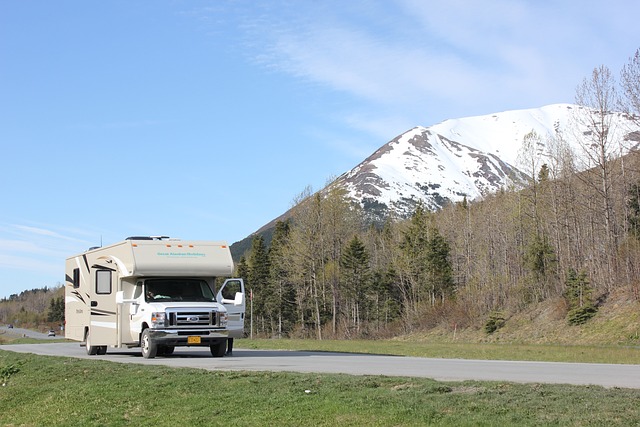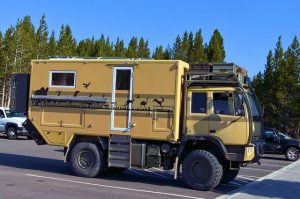Embarking on an RVing for Beginners adventure requires thorough preparation to ensure a safe and enjoyable trip. Novices must familiarize themselves with their RV's mechanical systems, including propane, water, electricity, and plumbing, to confidently handle minor issues. Safety is non-negotiable, demanding that smoke and carbon monoxide detectors, along with a fire extinguisher, are in working order. Regular vehicle maintenance, particularly of the braking system, tires, and battery, is crucial for a smooth journey. Prospective RVers must plan their route carefully to avoid low clearance bridges or closed roads and should be well-versed in local laws and campground regulations. Awareness of personal security measures and knowledge of theft prevention practices are essential for protecting belongings within the RV lifestyle. By understanding your RV's size, mastering maneuvers, staying informed on road conditions, weight limits, and maintaining proper insurance, RVers can navigate their travels with confidence, making RVing for Beginners a secure and unforgettable experience.
embarking on an RV adventure can be a fulfilling experience, offering the freedom to explore diverse landscapes comfortably. To ensure your journey is both enjoyable and secure, this article provides vital safety tips tailored for RVing beginners. From critical preparations to practical road navigation, we’ll guide you through the essentials to safeguard your travels in “Essential Preparations for Novice RVers: A Guide to Safe and Secure Travel.” Whether you’re a seasoned camper or new to RVing for Beginners, these insights will enhance your understanding of safe travel practices. Join us as we navigate the open road responsibly.
- Essential Preparations for Novice RVers: A Guide to Safe and Secure Travel
- Navigating the Open Road: Practical Safety Tips for RVing Beginners
Essential Preparations for Novice RVers: A Guide to Safe and Secure Travel

Embarking on an RV journey offers a unique blend of adventure and comfort, but for novice RVers, preparation is key to ensuring a secure and enjoyable experience. To navigate the open road confidently, it’s crucial to perform some essential preparations before departure. Firstly, familiarize yourself with the RV’s systems, including the propane, water, electricity, and plumbing. Understanding how these operate will help you troubleshoot minor issues without compromising your safety or comfort. Next, ensure your RV is equipped with reliable safety features such as smoke detectors, carbon monoxide detectors, and fire extinguishers. Regular maintenance checks on the vehicle’s braking system, tires, and battery life are also non-negotiable.
Moreover, planning your route in advance can save you from potential hazards like low clearance bridges or road closures. RVing for Beginners should also prioritize understanding local laws regarding RV parking, overnight stays, and campground regulations. It’s wise to map out designated campgrounds that cater to RVers, ensuring accessible amenities and emergency services. Additionally, securing your belongings and familiarizing yourself with theft prevention strategies can safeguard against opportunistic thieves. By meticulously preparing for the journey, both seasoned travelers and those new to RVing can embark on a secure and unforgettable adventure.
Navigating the Open Road: Practical Safety Tips for RVing Beginners

Embarking on an RV journey offers a unique blend of adventure and comfort, but it also comes with its own set of safety considerations. For those who are new to RVing for Beginners, understanding these is crucial. One of the first safety tips to keep in mind is familiarizing yourself with your RV’s systems, including plumbing, electricity, propane, and braking mechanisms. Regular maintenance checks can prevent mishaps on the road. Always ensure that all gas appliances are properly ventilated to avoid carbon monoxide poisoning, a silent danger that many RVers face.
When it comes to navigating the open road, RVing for Beginners should be mindful of their vehicle’s dimensions and clearance. Large RVs require more space to maneuver and can be affected by high winds and other adverse weather conditions. It’s important to plan your routes accordingly, avoiding low clearance bridges and narrow roads that could pose a risk. Additionally, practicing in an empty parking lot can help you get accustomed to the RV’s turning radius and blind spots. Safe RVing for Beginners also means staying informed about road conditions, weight limits, and ensuring that your insurance and roadside assistance are up-to-date. By preparing for the unexpected and respecting the road ahead, you can ensure a secure journey in your RV.
RVing for Beginners can be an exhilarating experience, offering the freedom to explore new destinations and enjoy the comforts of home on the road. To conclude, adhering to the safety tips outlined in this article is paramount for a secure journey. From thorough preparations tailored for novice RVers to practical driving and navigation strategies, these guidelines ensure you are well-equipped to handle the adventures that await. Remember to keep your vehicle maintained, understand the specifics of your RV’s systems, and stay informed about weather conditions and road safety. By doing so, you can confidently embrace the open road, knowing you’ve taken all necessary precautions for a safe and memorable RVing experience. Happy trails!
